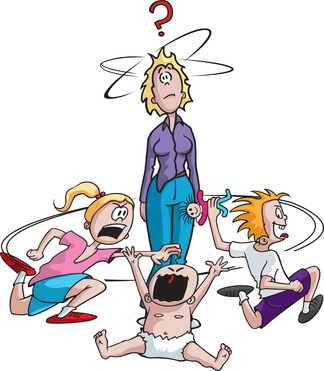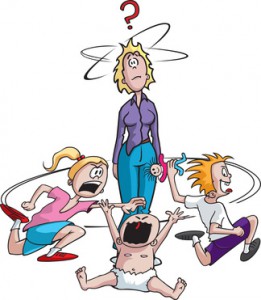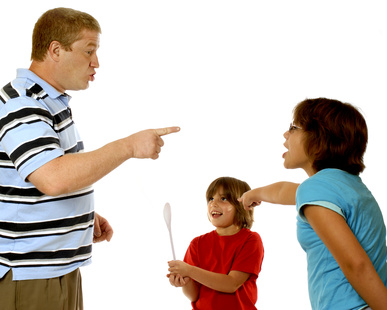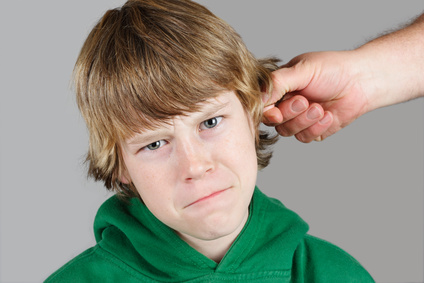The other day I made a mistake…or should I say another mistake. It’s true. It was actually one of the many mistakes I’ve made over my lifetime. Anyway, I made a mistake. Fortunately, my life is full of gracious people who acknowledged my mistake and continued to love me. Sure, they got a little upset…and some even laugh about my mistake. But they still helped me learn to avoid the same mistake in the future. And, as a result, I did learn. I grew; and hopefully I’ll avoid repeating that mistake in the future.
All this “got me thinking.” Children, like adults, make mistakes. Sometimes they make mistakes because of a lack of knowledge. Sometimes they make mistakes trying to “get away with something.” Sometimes they simply make a mistake. I have to say, as an adult, I have made mistakes for the same three reasons. Haven’t you?
But there seems to be a difference in how people respond to the mistake I make as an adult and the mistake a child makes. Let me explain. When a child makes a mistake, adults often seem to get angry. They treat the child’s mistake as an afront to their parenthood and their authority. They yell, often making the child feel worse and as though that mistake has defined them as a person. They dismiss the child’s explanations as excuses, often not even considering any positive intent behind his mistaken actions or words. They punish the child, sometimes harshly and in anger. And many do not teach the child how to avoid the mistake in the future.
However, when I make a mistake as an adult, the people in my life trust me to learn and grow from the natural consequence of my mistake. Even if they are upset or angry, they remain respectful. No one really yells. Many even listen to the explanations I give for my mistaken behavior. They allow me to explain the intent behind my actions…even if they disagree, they accept my explanation. They accept my intent while offering me guidance on how to avoid the mistake while achieving that intent in the future. All the while, they remain respectful (even in their anger) and they speak to me in a way that can help me listen.
If my friends and my family responded to my mistake in the same manner that I often see adults respond to a child’s mistake, I would walk away. I’d feel hurt, dishonored, even abused. I wouldn’t learn. I wouldn’t grow. I’d get defensive. I might even end the friendship. What makes us think children feel differently?
This leads me to an important lesson I learned about correcting my children…our children. Our children will respond to correction and discipline more readily when we approach them with respect. They will learn and grow when we take the time to learn about the intent and motivation behind their inappropriate behavior or words before respectfully pointing out what they did wrong. They will mature as we listen carefully, not just to their words but to the message of their behavior, before we offer them loving guidance on how to behave differently in the future.
In other words, our children will learn from their mistakes more readily when we approach them with the same respect that we give our adult friends. They will grow more mature when we approach them with the expectation that they want to learn and grow. We can all learn and grow from our mistakes, adults and children alike, when we approach both with acceptance, respect, and love.










 nagging are all disguised calls for love” (G. Godek). A call for love, eh? Well, “it ain’t working.” Still, I do believe it is true. When children are scared or confused or when they feel threatened or disconnected, they will “call for love.” They “call for love” through their behavior…and, misbehavior represents an ineffective communication of that need. Misbehavior, a miscommunicated “call for love,” may flow from any of four directions. Let’s look at them one at a time.
nagging are all disguised calls for love” (G. Godek). A call for love, eh? Well, “it ain’t working.” Still, I do believe it is true. When children are scared or confused or when they feel threatened or disconnected, they will “call for love.” They “call for love” through their behavior…and, misbehavior represents an ineffective communication of that need. Misbehavior, a miscommunicated “call for love,” may flow from any of four directions. Let’s look at them one at a time.  powerless is to avoid the power struggle. When we step into the power struggle with this child, she has already won. Do not argue. Talk less and act more. Let the “reality of consequences” do the talking. No need to argue about picking up the toys. Calmly offer the choice, “You can pick up your toys now or after dinner. If they are still there tonight, I will put them in time out for the rest of the week.” No arguing, no debating, no lecturing—just a choice and a consequence. Parents can also limit power struggles by eliciting help from the child whenever possible.
powerless is to avoid the power struggle. When we step into the power struggle with this child, she has already won. Do not argue. Talk less and act more. Let the “reality of consequences” do the talking. No need to argue about picking up the toys. Calmly offer the choice, “You can pick up your toys now or after dinner. If they are still there tonight, I will put them in time out for the rest of the week.” No arguing, no debating, no lecturing—just a choice and a consequence. Parents can also limit power struggles by eliciting help from the child whenever possible. energetically discipline their children in order to stop the misbehavior and teach more appropriate behavior. That is all well and good. However, as family shepherds we also have to remember that what we say and do during a heated interaction (like discipline) burns into the heart and mind of our child. Like quick drying cement, our words and actions quickly harden into rigid patterns of thought and beliefs that impact our child’s self-image, mood, and character. So, we need to be careful how we speak to our children during the heat of discipline. When you discipline your child, ask yourself these questions to assure your words and actions strengthen your child’s character.
energetically discipline their children in order to stop the misbehavior and teach more appropriate behavior. That is all well and good. However, as family shepherds we also have to remember that what we say and do during a heated interaction (like discipline) burns into the heart and mind of our child. Like quick drying cement, our words and actions quickly harden into rigid patterns of thought and beliefs that impact our child’s self-image, mood, and character. So, we need to be careful how we speak to our children during the heat of discipline. When you discipline your child, ask yourself these questions to assure your words and actions strengthen your child’s character.  behaved in accordance with family values and rules. Perhaps you can recall times he has gained attention through kind deeds or expressed anger with words rather than fists. Taking time to recall these positive incidents helps us avoid phrases like “you always…” and “you never….” It helps us realize that this incident of misbehavior is not a permanent pattern or a major character flaw but a temporary behavior that he can change given proper instruction.
behaved in accordance with family values and rules. Perhaps you can recall times he has gained attention through kind deeds or expressed anger with words rather than fists. Taking time to recall these positive incidents helps us avoid phrases like “you always…” and “you never….” It helps us realize that this incident of misbehavior is not a permanent pattern or a major character flaw but a temporary behavior that he can change given proper instruction.